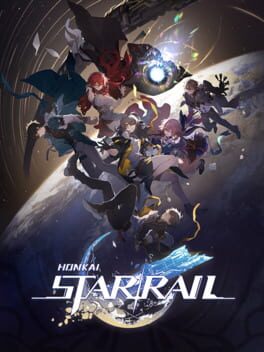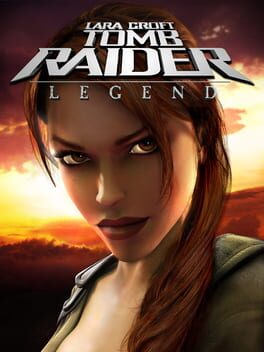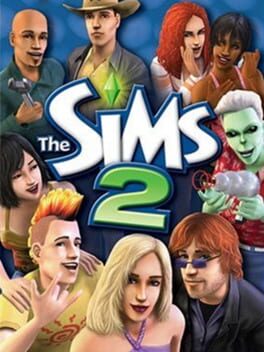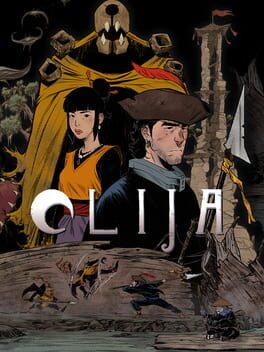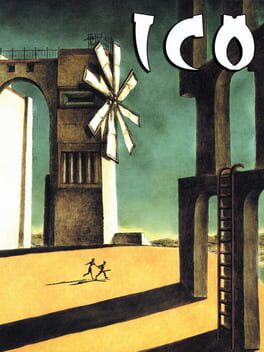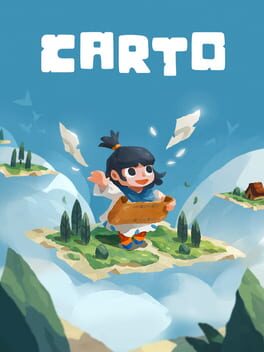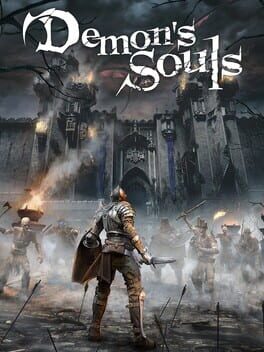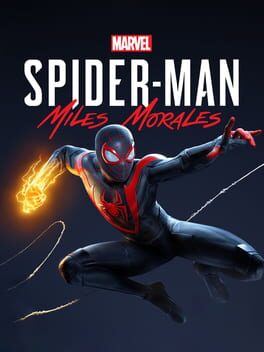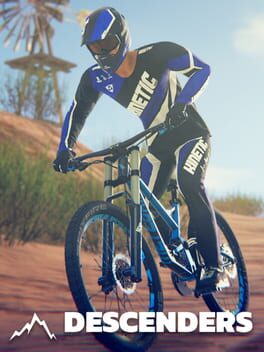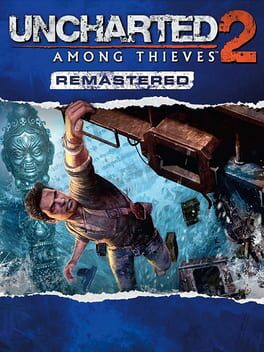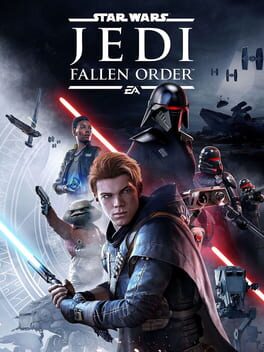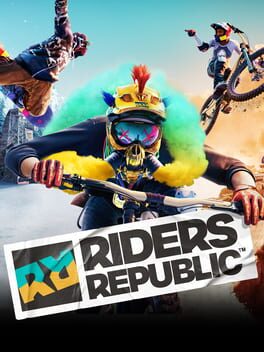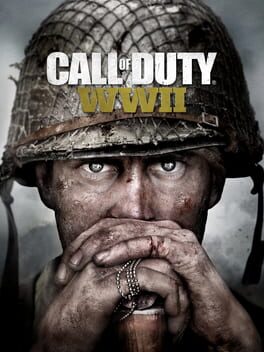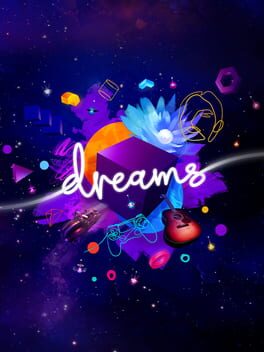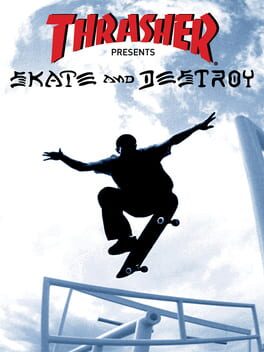bamdumtss
2023
I was going to wait until I get to the endgame before saying anything, but my gacha addiction has been surprisingly numb, and I'm probably not going to get there anytime soon, so I'm just gonna say my piece right now.
I liked Genshin but I have a lot of annoyances with it, to the point that I consider it a guilty pleasure. That is something I cannot say for Star Rail. It's a much more entertaining, focused and leaner game in every way.
The combat system is slick, flashy, and has more than enough depth considering its mobile game nature. Only thing holding it back is the gacha systems, of course.
While the overall story and world lore seems just okay, the writing for the character dialogues and environmental interactions are quite well done, especially in regards to the absurd "zoomer" sense of humor. They also addressed one of my biggest complaints with Genshin, where older characters would just cease to exist in the game world until another event that involves them pops up. Now you can get messaged by them in game as a daily thing, which is very cool. Even if there's a limit to this, I still consider it a big W. The writing style is still very "trash", as in exaggerated and full of unnecessary flowery words, and it's not gonna be for everyone. But as a trash enjoyer, I consider this to be good trash.
As someone who is not the biggest fan of the BOTW approach on open worlds, I much prefer the detailed and tightly designed smaller spaces that Star Rail offers. I guess it's closer to something like DQXI, although it's not as good.
The one thing that disappointed me is the music/soundtrack. I remember playing Genshin back when it only had up until Liyue content, and even back then there's a lot of great music. Meanwhile in Star Rail, the only track that I would legitimately say is great is the main menu track. The battle tracks are good, but not listening-to-it-on-its-own good.
Lastly, Mihoyo are still the kings of character design in the anime gacha space. It's like they got the scientific formula perfected after making a deal with the devil.
All I'm saying is that Star Rail is an actual good game, very much worth trying out. Also, Himeko best girl.
I liked Genshin but I have a lot of annoyances with it, to the point that I consider it a guilty pleasure. That is something I cannot say for Star Rail. It's a much more entertaining, focused and leaner game in every way.
The combat system is slick, flashy, and has more than enough depth considering its mobile game nature. Only thing holding it back is the gacha systems, of course.
While the overall story and world lore seems just okay, the writing for the character dialogues and environmental interactions are quite well done, especially in regards to the absurd "zoomer" sense of humor. They also addressed one of my biggest complaints with Genshin, where older characters would just cease to exist in the game world until another event that involves them pops up. Now you can get messaged by them in game as a daily thing, which is very cool. Even if there's a limit to this, I still consider it a big W. The writing style is still very "trash", as in exaggerated and full of unnecessary flowery words, and it's not gonna be for everyone. But as a trash enjoyer, I consider this to be good trash.
As someone who is not the biggest fan of the BOTW approach on open worlds, I much prefer the detailed and tightly designed smaller spaces that Star Rail offers. I guess it's closer to something like DQXI, although it's not as good.
The one thing that disappointed me is the music/soundtrack. I remember playing Genshin back when it only had up until Liyue content, and even back then there's a lot of great music. Meanwhile in Star Rail, the only track that I would legitimately say is great is the main menu track. The battle tracks are good, but not listening-to-it-on-its-own good.
Lastly, Mihoyo are still the kings of character design in the anime gacha space. It's like they got the scientific formula perfected after making a deal with the devil.
All I'm saying is that Star Rail is an actual good game, very much worth trying out. Also, Himeko best girl.
2006
[Review of the Gamecube version]
I've always been a big fan of third person action adventure stuff. Uncharted is my favorite video game series, and I adore both Infernal Crusade and Emperor's Tomb, the two best third person Indy games. Unfortunately I haven't had the same luck with Tomb Raider, at least before this game. The original Tomb Raiders were too archaic and dated for me, and the newer ones are just not good games IMO. While I'm not completely in love with Legend, I did like it enough to actually finish it, and I have good things to say about it.
First off, I really like Lara's depiction here. She's a capable and confident person, with a professional, but still personalized approach on her work. There's quite a lot of great lines from her. "From this moment on, every breath you draw is a gift for me" might be my favorite one. She also got good fashion sense, solid outfit picks from start to finish. She definitely carries the story for me, as without her, none of the other character, overall plot or lore would be worth caring about.
As normative determinism would have it, the game's best moments comes from the actual tomb raiding levels, as they usually feature the best platforming sections and puzzles, which are the strongest parts of the gameplay. The platforming is usually slower paced, and it's fun to figure where you need to go next. Same goes for the puzzles, which are mostly quite simple, but still require a more detailed look-around at your surroundings. I do notice that many of the puzzles are physics based, which I'm sure is the cool trend back then. The one big flaw of the platforming system is this one mechanic where you need to do a QTE if you jump to a ledge "too soon", and it has lead to many setbacks and slightly tilting moments, especially since it's not exactly a predictable event.
You can't call yourself an action adventure without some baddies to beat, and that's where the old school lock-on gunplay comes in. You're expected to lock-on to enemies, shoot to deal damage and constantly strafe and dodge to avoid getting hurt. This could have been executed much better, to be honest. The lock-on system can be a bit hard to control, and the enemy and weapon variety are utterly lacking. There's not a lot of combat sections, but their presence are very palpable.
There's also boss fights, and it's quite all over the place in terms of quality. I beat the first one with just a shotgun and a bit of luck, and most of the other bosses either have a slight puzzle gimmick that only prolongs the inevitable, or require environment usage in order to kill. The latter ones are more fun, but still, they're not exactly great. I do enjoy the final boss fight quite a bit, it's quite satisfying to be able to finally let loose and do overpowered shenanigans.
Some other smaller things worth mentioning:
- Great atmosphere and visual design in all of the levels!
- There's also vehicle driving sections, which are usually too long and not very fun.
- I wish the flashlight is more effective, many parts of the game are too dark even with them turned on. This definitely made it harder to figure out where to go sometimes.
- Playing this made me realize that Crystal Dynamics were psychos all along. The QTE deaths can be so comically brutal, but it didn't quite disgust me as much as the ones in the newer games.
- I'm surprised by how short this game is, only 5 hours in-game time (although it felt a bit longer than that).
While Legend didn't quite become its namesake, it's not because of its lack of qualities. There's a solid action adventure romp here that will satisfy fans of the genre, and for those who are mostly curious, it'll probably delight you just enough.
I've always been a big fan of third person action adventure stuff. Uncharted is my favorite video game series, and I adore both Infernal Crusade and Emperor's Tomb, the two best third person Indy games. Unfortunately I haven't had the same luck with Tomb Raider, at least before this game. The original Tomb Raiders were too archaic and dated for me, and the newer ones are just not good games IMO. While I'm not completely in love with Legend, I did like it enough to actually finish it, and I have good things to say about it.
First off, I really like Lara's depiction here. She's a capable and confident person, with a professional, but still personalized approach on her work. There's quite a lot of great lines from her. "From this moment on, every breath you draw is a gift for me" might be my favorite one. She also got good fashion sense, solid outfit picks from start to finish. She definitely carries the story for me, as without her, none of the other character, overall plot or lore would be worth caring about.
As normative determinism would have it, the game's best moments comes from the actual tomb raiding levels, as they usually feature the best platforming sections and puzzles, which are the strongest parts of the gameplay. The platforming is usually slower paced, and it's fun to figure where you need to go next. Same goes for the puzzles, which are mostly quite simple, but still require a more detailed look-around at your surroundings. I do notice that many of the puzzles are physics based, which I'm sure is the cool trend back then. The one big flaw of the platforming system is this one mechanic where you need to do a QTE if you jump to a ledge "too soon", and it has lead to many setbacks and slightly tilting moments, especially since it's not exactly a predictable event.
You can't call yourself an action adventure without some baddies to beat, and that's where the old school lock-on gunplay comes in. You're expected to lock-on to enemies, shoot to deal damage and constantly strafe and dodge to avoid getting hurt. This could have been executed much better, to be honest. The lock-on system can be a bit hard to control, and the enemy and weapon variety are utterly lacking. There's not a lot of combat sections, but their presence are very palpable.
There's also boss fights, and it's quite all over the place in terms of quality. I beat the first one with just a shotgun and a bit of luck, and most of the other bosses either have a slight puzzle gimmick that only prolongs the inevitable, or require environment usage in order to kill. The latter ones are more fun, but still, they're not exactly great. I do enjoy the final boss fight quite a bit, it's quite satisfying to be able to finally let loose and do overpowered shenanigans.
Some other smaller things worth mentioning:
- Great atmosphere and visual design in all of the levels!
- There's also vehicle driving sections, which are usually too long and not very fun.
- I wish the flashlight is more effective, many parts of the game are too dark even with them turned on. This definitely made it harder to figure out where to go sometimes.
- Playing this made me realize that Crystal Dynamics were psychos all along. The QTE deaths can be so comically brutal, but it didn't quite disgust me as much as the ones in the newer games.
- I'm surprised by how short this game is, only 5 hours in-game time (although it felt a bit longer than that).
While Legend didn't quite become its namesake, it's not because of its lack of qualities. There's a solid action adventure romp here that will satisfy fans of the genre, and for those who are mostly curious, it'll probably delight you just enough.
2005
The Sims 2 for the PSP is, to put it simply, positively bizzare. If you know nothing about this game, the familiar Sims-style character creation will lull you into a false sense of security. Next thing you know, your character is forced to live on a residential area that is built on top of a graveyard, and you'll be dragged into all sorts of uncanny and supernatural hijinks. Of course you can't forget that you got into this mess because your car mysteriously broke, and the mechanic that was supposed to fix it literally disappeared out of thin air, along with your car AND the mechanic's garage. All of this happened while you're getting tutorial'd by a spiritually passionate convenience store owner. This is only the start of a comical, slightly dark and self-referential adventure game that is definitely too strange for its target audience.
"Hold on", you might say. "Adventure game?", you might ask. Yes. This is not a straightforward Sims port, in case it's not clear yet. There are still Sims features here, like managing your sims needs, making your sims learn new skills, and socially interacting with other sims. But the game uses these mechanics, and adds a couple others, in the framework of an adventure game, where you play as a single character and complete various objectives. Think of Shenmue, but with sims. Heck, there's even a recognizable reliance on minigames, such as for the jobs that you'll be doing in order to get cash (whack a mole but with zombies, for example), or the Simon Says minigame for the aforementioned social mechanics. I find this blend of Sims and Shenmue-esque adventure to be a entertaining and novel experience, as it not only has fun ideas, but also executed quite well. For example, a big part of the game is learning other characters' secrets for mission-related reasons, and you can do this by getting close (or intimidate) them. This can be made easier by increasing your character's charisma (practicing speech with a mirror).
The gameplay loop can be quite simplistic and repetitive, and it can be easy to learn a bunch of skills quickly early on, which will make most of the objectives much easier. Despite that, the game just keeps throwing crazy stuff at you, and it's still fun to see everything this wacky game has to offer, even if it's not a very long experience.
The PSP's Sims 2 is like a baby's adventure game. Anyone can finish it if they want to. But giving this to children might irreparably devastate their growth and development, and turn them into literal goblins that speak gibberish. I guess it's subjective whether or not that's a good thing. I vote good.
"Hold on", you might say. "Adventure game?", you might ask. Yes. This is not a straightforward Sims port, in case it's not clear yet. There are still Sims features here, like managing your sims needs, making your sims learn new skills, and socially interacting with other sims. But the game uses these mechanics, and adds a couple others, in the framework of an adventure game, where you play as a single character and complete various objectives. Think of Shenmue, but with sims. Heck, there's even a recognizable reliance on minigames, such as for the jobs that you'll be doing in order to get cash (whack a mole but with zombies, for example), or the Simon Says minigame for the aforementioned social mechanics. I find this blend of Sims and Shenmue-esque adventure to be a entertaining and novel experience, as it not only has fun ideas, but also executed quite well. For example, a big part of the game is learning other characters' secrets for mission-related reasons, and you can do this by getting close (or intimidate) them. This can be made easier by increasing your character's charisma (practicing speech with a mirror).
The gameplay loop can be quite simplistic and repetitive, and it can be easy to learn a bunch of skills quickly early on, which will make most of the objectives much easier. Despite that, the game just keeps throwing crazy stuff at you, and it's still fun to see everything this wacky game has to offer, even if it's not a very long experience.
The PSP's Sims 2 is like a baby's adventure game. Anyone can finish it if they want to. But giving this to children might irreparably devastate their growth and development, and turn them into literal goblins that speak gibberish. I guess it's subjective whether or not that's a good thing. I vote good.
2021
[Reposting my old reviews from another site for archive, and updating them if needed]
This game has been quite the rollercoaster ride for me. Leading up to its launch, I wasn't very interested in playing it because there's nothing that struck me as being something special. I pretty much ignored this game until I checked out one of the story trailers near its release out of curiosity. The trailer I saw had showed some phenomenal minimalist animations that served a love story arc that I didn't expect at all, and because of that I decided to try this game out. Now, I'm happy to say that I love this game. It's consistently fun and engaging to play, and there's some lovely story moments sprinkled throughout.
I'll get the story out of the way first. The main character is a ship captain that got stranded in a unfamiliar land after a storm hit his ship and wrecked everything, and he need to find a way to return home with his fellow castaways. The game leaves a lot to the imagination, since most of the dialogues are pretty vague, little is explained, and it's the main way of building its world and setting. The thing that impressed me the most is how well the game conveys emotion and detail in many of its story scenes (mostly through the animations), while being constricted by its simplistic nature and art style. It also uses interactivity to great effect at certain points. There's a very intimate interactive moment between the main character and his lover at the very end of the game that actually made me shed a tear.
This game is essentially a semi-linear action platforming game that takes a lot of cues from 2D games of recent years. It channels that metroidvania-esque feel of discovering new areas and solving obstacles along the way, while staying true to its simplistic nature. Each of the main areas in the game has a dungeon that you need to go through in order to get keys that'll unlock the next set of areas. Every once in a while there are boss encounters after each dungeon, while other times there are only puzzles.
The levels themselves are quite varied in terms of aesthetics, from dark caves full of mindless slaves to beautiful yet not-so-peaceful forests. The levels are designed around your trusty harpoon's ability, which allows you to teleport to wherever the harpoon is thrown. The best thing about the level design is that it strikes the balance of being not too stressful and confusing, but also not too straightforward which would make it feel boring. Maybe the only criticism I have about it is that the levels doesn't feel so different compared to each other in gameplay, outside of the visual aesthetics.
Speaking of using the harpoon, the combat in this game is quite fun. The impact of hitting the enemies feels satisfying, and you'll often see their bodies explode with surprisingly gruesome detail as you smack them against a wall, which adds a lot to that satisfaction. The combat really shines during the boss battles, especially the later ones. I was quite impressed by how frantic and intense some of the bosses are, and most of them have really cool visual designs.
There's also hats that provides unique abilities, such as allowing the harpoon to accumulate lightning energy. The hats are only obtainable through crafting, and the resources you need are scattered in the main areas, with some resources only appearing later on. Some of the hats are certainly more useful than others, but at the very least they're fun to try out at least once. I do wish that obtaining these hats doesn't feel so random, it can feel like you just got these resources accidentally while exploring.
The difficulty of the game is a bit on the easy side (I think I only died three times), but the game never got boring, mostly because of how well it keeps you in check by putting all sorts of hazards and situations that'll eat my health away if you get careless.
While it's not the most unique game out there, Olija makes the most out of its minimalist approach and it even punches above its weight in some aspects. It's not a long game, and I expect people to take issue with that, but I had a great and satisfying time with it.
This game has been quite the rollercoaster ride for me. Leading up to its launch, I wasn't very interested in playing it because there's nothing that struck me as being something special. I pretty much ignored this game until I checked out one of the story trailers near its release out of curiosity. The trailer I saw had showed some phenomenal minimalist animations that served a love story arc that I didn't expect at all, and because of that I decided to try this game out. Now, I'm happy to say that I love this game. It's consistently fun and engaging to play, and there's some lovely story moments sprinkled throughout.
I'll get the story out of the way first. The main character is a ship captain that got stranded in a unfamiliar land after a storm hit his ship and wrecked everything, and he need to find a way to return home with his fellow castaways. The game leaves a lot to the imagination, since most of the dialogues are pretty vague, little is explained, and it's the main way of building its world and setting. The thing that impressed me the most is how well the game conveys emotion and detail in many of its story scenes (mostly through the animations), while being constricted by its simplistic nature and art style. It also uses interactivity to great effect at certain points. There's a very intimate interactive moment between the main character and his lover at the very end of the game that actually made me shed a tear.
This game is essentially a semi-linear action platforming game that takes a lot of cues from 2D games of recent years. It channels that metroidvania-esque feel of discovering new areas and solving obstacles along the way, while staying true to its simplistic nature. Each of the main areas in the game has a dungeon that you need to go through in order to get keys that'll unlock the next set of areas. Every once in a while there are boss encounters after each dungeon, while other times there are only puzzles.
The levels themselves are quite varied in terms of aesthetics, from dark caves full of mindless slaves to beautiful yet not-so-peaceful forests. The levels are designed around your trusty harpoon's ability, which allows you to teleport to wherever the harpoon is thrown. The best thing about the level design is that it strikes the balance of being not too stressful and confusing, but also not too straightforward which would make it feel boring. Maybe the only criticism I have about it is that the levels doesn't feel so different compared to each other in gameplay, outside of the visual aesthetics.
Speaking of using the harpoon, the combat in this game is quite fun. The impact of hitting the enemies feels satisfying, and you'll often see their bodies explode with surprisingly gruesome detail as you smack them against a wall, which adds a lot to that satisfaction. The combat really shines during the boss battles, especially the later ones. I was quite impressed by how frantic and intense some of the bosses are, and most of them have really cool visual designs.
There's also hats that provides unique abilities, such as allowing the harpoon to accumulate lightning energy. The hats are only obtainable through crafting, and the resources you need are scattered in the main areas, with some resources only appearing later on. Some of the hats are certainly more useful than others, but at the very least they're fun to try out at least once. I do wish that obtaining these hats doesn't feel so random, it can feel like you just got these resources accidentally while exploring.
The difficulty of the game is a bit on the easy side (I think I only died three times), but the game never got boring, mostly because of how well it keeps you in check by putting all sorts of hazards and situations that'll eat my health away if you get careless.
While it's not the most unique game out there, Olija makes the most out of its minimalist approach and it even punches above its weight in some aspects. It's not a long game, and I expect people to take issue with that, but I had a great and satisfying time with it.
2012
[Reposting my old reviews from another site for archive, and updating them if needed]
As somebody who played LTG and SOTC first, I can't believe how good this game is! There's no better example of a game's quality being more than the sum of its parts.
First of all, Bluepoint must have done something with the original controls, because I think this controls way better than both TLG and the SOTC remake. Unlike in those other two games, I never got really annoyed during the platforming parts, and while ordering Yorda around can be a bit finicky, it never gets worse than slowing me down for a few seconds. Same thing about the camera. I was surprised about the fixed cameras at first, but it turned out great. It gave the game a highly cinematic look and feel, without negatively affecting the gameplay.
The castle's atmosphere is top notch. It feels empty/deserted, but in this sinister kind of way. It would have been one of those places that is so uncomfortable for me to explore on my own, because it always feels like something is watching you. It's also backed up by very effective ambiance and a handful of creepy tracks (which also helped with keeping the combat's intensity right till the end). The design of the castle is also great. While each section of the castle has a unique feel, all of them have this sense of dread and loneliness that unites them all, not to mention the incredibly consistent art and level design style. It makes the castle not only feel very interconnected, but also real and tangible.
Story wise, it's definitely Ueda-san's most minimalist work. I really like that Yorda's personality is mostly shown through her mannerisms, like shaking her head frantically when I keep bugging her to follow me up a path she can't take. I also love that I can see the main character and Yorda asleep on the couch whenever I return to the game after loading a save file, it's super cute. It's a masterclass of relationship building through non-dialogue means, and I know this because I always feel like shit whenever she got hurt. I don't usually care for fictional characters that much, but this game certainly did it without breaking a sweat. I definitely see some parallels between this and TLG in this aspect.
I think this is a unpopular opinion, but Ico is easily Ueda-san's finest game for me. I have no noteworthy complaints about it. Absolute masterpiece.
As somebody who played LTG and SOTC first, I can't believe how good this game is! There's no better example of a game's quality being more than the sum of its parts.
First of all, Bluepoint must have done something with the original controls, because I think this controls way better than both TLG and the SOTC remake. Unlike in those other two games, I never got really annoyed during the platforming parts, and while ordering Yorda around can be a bit finicky, it never gets worse than slowing me down for a few seconds. Same thing about the camera. I was surprised about the fixed cameras at first, but it turned out great. It gave the game a highly cinematic look and feel, without negatively affecting the gameplay.
The castle's atmosphere is top notch. It feels empty/deserted, but in this sinister kind of way. It would have been one of those places that is so uncomfortable for me to explore on my own, because it always feels like something is watching you. It's also backed up by very effective ambiance and a handful of creepy tracks (which also helped with keeping the combat's intensity right till the end). The design of the castle is also great. While each section of the castle has a unique feel, all of them have this sense of dread and loneliness that unites them all, not to mention the incredibly consistent art and level design style. It makes the castle not only feel very interconnected, but also real and tangible.
Story wise, it's definitely Ueda-san's most minimalist work. I really like that Yorda's personality is mostly shown through her mannerisms, like shaking her head frantically when I keep bugging her to follow me up a path she can't take. I also love that I can see the main character and Yorda asleep on the couch whenever I return to the game after loading a save file, it's super cute. It's a masterclass of relationship building through non-dialogue means, and I know this because I always feel like shit whenever she got hurt. I don't usually care for fictional characters that much, but this game certainly did it without breaking a sweat. I definitely see some parallels between this and TLG in this aspect.
I think this is a unpopular opinion, but Ico is easily Ueda-san's finest game for me. I have no noteworthy complaints about it. Absolute masterpiece.
2020
[Reposting my old reviews from another site for archive, and updating them if needed]
This took me 1 month to finish, which might sound weird considering it's just 5-6 hours in length. This is one of those games that needs a specific kind of mood to enjoy for me, and honestly there's a part of me that wants this game to not end yet because it's just so goddamn lovely. I'm very, very impressed by how this good this game turned out to be.
The game's main mechanic is connecting a bunch of map tiles in certain ways to be able to progress. It could have very easily ran out of steam early on, but it just keeps adding interesting twists in each new level, which is enough to keep the game far away from being boring. It successfully makes you feel like you have this all-powerful ability in your hands, while also offering a sense of adventure from exploring new and strange places.
An aspect of the game that really surprised me is the story and world lore. The game sets up a cohesive and charismatic world filled with neat and memorable characters, and each time the game presents each new bits of the story as the adventure goes, it feels so exciting to me. There's a good variety of biomes to explore, and each new area has it's own community with it's own culture and stuff. By the end of the game, I actually got attached to many of the characters, despite most of them not having a significant amount of development, since y'know, it's such a short game. There's also some very touching moments in the story, and I almost cried at one point.
There's also a particularly cool aspect in the story that not only adds an interesting layer to the way the player views this world, but also supplements all the side story arcs in the game in a satisfying way. I don't want to mention it by name to avoid spoiling it.
Lastly, the chill and jolly vibes of this game is very palpable. From seeing various events that happen in the story, and the way they're presented, it's clear to me that the devs intended this game to feel uplifting. The way the many of the characters talk to each other, the art style, the music; everything in this game is just built to make me smile and it's very lovely.
This is an easy 4.5 stars for me, and the only reason I won't give it a higher score is because I know they can do so much more with this world and gameplay concept. I feel like they're holding back at times, but it still turned out to be wonderful.
This took me 1 month to finish, which might sound weird considering it's just 5-6 hours in length. This is one of those games that needs a specific kind of mood to enjoy for me, and honestly there's a part of me that wants this game to not end yet because it's just so goddamn lovely. I'm very, very impressed by how this good this game turned out to be.
The game's main mechanic is connecting a bunch of map tiles in certain ways to be able to progress. It could have very easily ran out of steam early on, but it just keeps adding interesting twists in each new level, which is enough to keep the game far away from being boring. It successfully makes you feel like you have this all-powerful ability in your hands, while also offering a sense of adventure from exploring new and strange places.
An aspect of the game that really surprised me is the story and world lore. The game sets up a cohesive and charismatic world filled with neat and memorable characters, and each time the game presents each new bits of the story as the adventure goes, it feels so exciting to me. There's a good variety of biomes to explore, and each new area has it's own community with it's own culture and stuff. By the end of the game, I actually got attached to many of the characters, despite most of them not having a significant amount of development, since y'know, it's such a short game. There's also some very touching moments in the story, and I almost cried at one point.
There's also a particularly cool aspect in the story that not only adds an interesting layer to the way the player views this world, but also supplements all the side story arcs in the game in a satisfying way. I don't want to mention it by name to avoid spoiling it.
Lastly, the chill and jolly vibes of this game is very palpable. From seeing various events that happen in the story, and the way they're presented, it's clear to me that the devs intended this game to feel uplifting. The way the many of the characters talk to each other, the art style, the music; everything in this game is just built to make me smile and it's very lovely.
This is an easy 4.5 stars for me, and the only reason I won't give it a higher score is because I know they can do so much more with this world and gameplay concept. I feel like they're holding back at times, but it still turned out to be wonderful.
2020
[Reposting my old reviews from another site for archive, and updating them if needed]
I can safely say that this is my favorite Souls game. No, not just within the Souls series, but the genre itself. Going into it, I had tempered my expectations because I knew that many parts of the game wouldn't be as refined or spotless as the newer games by From Soft, and despite that being true, Bluepoint's remake efforts have rendered every flaw of the game to be unremarkable at best. The cutting edge technical prowess in display is simply sublime. The controls feel like a dream, and it never became the subject of my frustrations. Each of the levels' atmosphere are painstakingly presented with graceful quality, and it's easy for me to be distracted from the task at hand by the amazingly detailed graphics and sound design. The music has been wonderfully rearranged into an modern orchestral version, and I can't imagine it being done better than this. From an audiovisual perspective, it's quite convincing as a next-gen showpiece.
Those amazing qualities let the core of the gameplay truly shine, and to put it simply, the light did not falter. The pace of the combat is perfect for me: not too slow, not too fast. I love how condensed the levels feel from a design standpoint: none of them are truly big in scale, but getting through them still feels like a real adventure to me, because there's just so much going on in each of them. Obviously there are levels that stand out more than the rest (4-1 and 3-2 comes to mind), but overall it's very solid. While the enemy AI can be exploitable, I still give them some respect because they can surprise me at times with their aggressiveness. In short, the moment-to-moment gameplay of exploring these levels is a top tier experience.
I think the closest thing the game has to a fatal flaw are the bosses. While some of them are either quite challenging (Flamelurker, Maneater) or provide an entertaining set piece (Fool's Idol, Storm King), there are a couple that are just too tame, and fall flat on their faces. Of course, it's indicative of the original game's role as a prototype of sorts, a big step towards the Souls formula that we know today. Still, it's hard to completely forgive considering the heights From has achieved in their newer titles.
I think the fact that I'm even thinking about playing NG+ shows how much I enjoyed this game. As somebody who's not a big Souls enjoyer, this is quite the refreshing experience, and I wish more Souls-like have the same kind of experimental spirit instead of just trying to polish existing mechanics to perfection.
I can safely say that this is my favorite Souls game. No, not just within the Souls series, but the genre itself. Going into it, I had tempered my expectations because I knew that many parts of the game wouldn't be as refined or spotless as the newer games by From Soft, and despite that being true, Bluepoint's remake efforts have rendered every flaw of the game to be unremarkable at best. The cutting edge technical prowess in display is simply sublime. The controls feel like a dream, and it never became the subject of my frustrations. Each of the levels' atmosphere are painstakingly presented with graceful quality, and it's easy for me to be distracted from the task at hand by the amazingly detailed graphics and sound design. The music has been wonderfully rearranged into an modern orchestral version, and I can't imagine it being done better than this. From an audiovisual perspective, it's quite convincing as a next-gen showpiece.
Those amazing qualities let the core of the gameplay truly shine, and to put it simply, the light did not falter. The pace of the combat is perfect for me: not too slow, not too fast. I love how condensed the levels feel from a design standpoint: none of them are truly big in scale, but getting through them still feels like a real adventure to me, because there's just so much going on in each of them. Obviously there are levels that stand out more than the rest (4-1 and 3-2 comes to mind), but overall it's very solid. While the enemy AI can be exploitable, I still give them some respect because they can surprise me at times with their aggressiveness. In short, the moment-to-moment gameplay of exploring these levels is a top tier experience.
I think the closest thing the game has to a fatal flaw are the bosses. While some of them are either quite challenging (Flamelurker, Maneater) or provide an entertaining set piece (Fool's Idol, Storm King), there are a couple that are just too tame, and fall flat on their faces. Of course, it's indicative of the original game's role as a prototype of sorts, a big step towards the Souls formula that we know today. Still, it's hard to completely forgive considering the heights From has achieved in their newer titles.
I think the fact that I'm even thinking about playing NG+ shows how much I enjoyed this game. As somebody who's not a big Souls enjoyer, this is quite the refreshing experience, and I wish more Souls-like have the same kind of experimental spirit instead of just trying to polish existing mechanics to perfection.
[Reposting my old reviews from another site for archive, and updating them if needed]
This game a weird one for me because while I wanted more out of it, I also think that it already did many things in its compact frame to make it a great Spider-Man experience.
Going through Miles' story is just an absolute joy. It's so tied to his identity of being not only a Harlem kid, but also being in a family full of strong people, and dealing with the high expectations of being a worthy Spider-Man. While I wanted the game to go a bit deeper with presenting his troubles and personal feelings (I thought the quick pace of the story made it feel like they're glossing over a couple things and streamlining events too much), it's still a good story overall. The cast of characters are pretty solid, I like that Miles and the villain had personal ties to the overall plot, which makes the story have believable stakes.
Obviously a lot of the core gameplay is very similar to the 2018 Spider-Man game, but there are a couple things that separates it. I particularly like how the game accentuates Miles' character through various aspects of the game, such as incorporating his music production hobby to the soundtrack (great mix of orchestral instruments and hip hop beat), and his explosive energy through his Venom powers, which are very fun to use. I also like how the Friendly Neighborhood app makes Miles feel much closer to the people of NY, and it reflects his grassroots nature in the process, which also ties into the main story in a satisfying way.
With the combat, I wasn't really feeling it in the first 2-3 hours because I think a lot of the gadgets doesn't feel useful. But, as the game ramps up by adding more enemy types, you are pressured to utilize all your gadgets and powers against them, which is great. Also, the boss fights here are pretty fun. They're mostly for spectacle but they can get a bit messy if you let your guard down.
I think the way they handled the side objectives and collectibles is better than in the previous game, with each activity having some sort of connection to Miles as a character. I really like collecting the time capsules in particular, it feels nice to see Miles looking back and providing context to each item. They're also a bit more varied, and the game doesn't put too much attention to the repetitive random crime activities.
All in all, this is a very solid and compact game that reminds us all once again the innate joy of playing as a Spider-Man. I hope to see Insomniac experiment more with the gameplay in particular. I think we've yet to reach a peak with how great a Spider-Man game can truly be, and that's exciting to think about.
This game a weird one for me because while I wanted more out of it, I also think that it already did many things in its compact frame to make it a great Spider-Man experience.
Going through Miles' story is just an absolute joy. It's so tied to his identity of being not only a Harlem kid, but also being in a family full of strong people, and dealing with the high expectations of being a worthy Spider-Man. While I wanted the game to go a bit deeper with presenting his troubles and personal feelings (I thought the quick pace of the story made it feel like they're glossing over a couple things and streamlining events too much), it's still a good story overall. The cast of characters are pretty solid, I like that Miles and the villain had personal ties to the overall plot, which makes the story have believable stakes.
Obviously a lot of the core gameplay is very similar to the 2018 Spider-Man game, but there are a couple things that separates it. I particularly like how the game accentuates Miles' character through various aspects of the game, such as incorporating his music production hobby to the soundtrack (great mix of orchestral instruments and hip hop beat), and his explosive energy through his Venom powers, which are very fun to use. I also like how the Friendly Neighborhood app makes Miles feel much closer to the people of NY, and it reflects his grassroots nature in the process, which also ties into the main story in a satisfying way.
With the combat, I wasn't really feeling it in the first 2-3 hours because I think a lot of the gadgets doesn't feel useful. But, as the game ramps up by adding more enemy types, you are pressured to utilize all your gadgets and powers against them, which is great. Also, the boss fights here are pretty fun. They're mostly for spectacle but they can get a bit messy if you let your guard down.
I think the way they handled the side objectives and collectibles is better than in the previous game, with each activity having some sort of connection to Miles as a character. I really like collecting the time capsules in particular, it feels nice to see Miles looking back and providing context to each item. They're also a bit more varied, and the game doesn't put too much attention to the repetitive random crime activities.
All in all, this is a very solid and compact game that reminds us all once again the innate joy of playing as a Spider-Man. I hope to see Insomniac experiment more with the gameplay in particular. I think we've yet to reach a peak with how great a Spider-Man game can truly be, and that's exciting to think about.
2019
This game is clearly low budget but it's quite decent in the most important aspects. The controls felt good and easy to grasp, but there's quite a bit more to learn from experience, like managing speed before big jumps or manuevering curvy steep tracks. The procedural levels are okay, it can feel a bit soulless sometimes but it does help making it more replayable. The main roguelike mode is pretty standard for the genre, but in the context of extreme sports, it's a nice change of pace. Things get hard pretty quickly atter the first big area in terms of level design and the challenges you're given, and it's a bit too steep of a difficulty jump for me, but you can unlock shortcuts if you replay an area enough times, so progression is only a matter of time. The game isn't strict on off road limits so you can cheese it if there's an annoyingly hard part. There's some silly cosmetics to unlock, I just wish there's more of them instead of the usual extreme sport attire. Overall, it's worth a try if you're into these kind of high speed games.
I always had complicated feelings with Uncharted 2, and as time goes on, it only grows increasingly entangled and difficult to parse, like the old wired earphones that I left in my pockets for longer than I should. Thus, a replay is in order. My first Uncharted game is Uncharted 3, and I was completely blown away by it back then. I only got to the previous two Uncharteds about 2 years after, and I think the perspective of coming from Uncharted 3 definitely hurt Uncharted 2 in my eyes. While the story is more structurally sound and tightly paced, everything else left me unimpressed. The set pieces and technical aspects are an expected step down, and the locales, villains and supernatural/mythology elements are much less interesting to me. The combat sections are usually too long and happens too often, resulting in a body count that is far too high. I don't even want to talk about fighting the supernatural beings in the last section of the game, and that dreadful final boss. In my eyes, Uncharted 2 has been outdone by its successors, especially after Uncharted 4 came out. I would have said the same thing with Uncharted 1, but I came to realize that the game's self-contained nature and raw "first entry" feel has a long lasting charm that manages to outlast Uncharted 2, at least for me.
Still, nothing can delude me into thinking that I don't have a great time with Uncharted 2. Like all other Uncharteds, all of its best qualities are very accessible, and the qualities are varied. Frantic gunplay, likeable characters, impressive detail, memorable environments, stunning set pieces, and so on. Not to mention, the game fluidly weaves various gameplay element into its simple and elegant controls, and the remaster has done a great job of updating this and all other technical aspects. Again, all of these especially applies to future Uncharted games in a much higher degree (and each newer entry adds their own spice into the formula), but it's nothing to scoff at.
Uncharted 2 still stands as a major trailblazer of the cinematic gaming era, with it's incredible success of emulating theatrical blockbusters in real-time software, and setting the basic formula for all future followers. As more and more games embrace looser pacing in the service of widening gameplay flavors and increasing the sense of freedom, Uncharted 2's influence wanes, but just like its inspirations, it has left enough of an impression through mostly shock and awe, as the most advanced video game technologies of the time converge to satisfy PS3 owners during a landmark year for the console. "You just had to be there!"
Still, nothing can delude me into thinking that I don't have a great time with Uncharted 2. Like all other Uncharteds, all of its best qualities are very accessible, and the qualities are varied. Frantic gunplay, likeable characters, impressive detail, memorable environments, stunning set pieces, and so on. Not to mention, the game fluidly weaves various gameplay element into its simple and elegant controls, and the remaster has done a great job of updating this and all other technical aspects. Again, all of these especially applies to future Uncharted games in a much higher degree (and each newer entry adds their own spice into the formula), but it's nothing to scoff at.
Uncharted 2 still stands as a major trailblazer of the cinematic gaming era, with it's incredible success of emulating theatrical blockbusters in real-time software, and setting the basic formula for all future followers. As more and more games embrace looser pacing in the service of widening gameplay flavors and increasing the sense of freedom, Uncharted 2's influence wanes, but just like its inspirations, it has left enough of an impression through mostly shock and awe, as the most advanced video game technologies of the time converge to satisfy PS3 owners during a landmark year for the console. "You just had to be there!"
As a start, let me say that I bounced off this game two times before. The first, when I just grew too frustrated with the PS4 version's jankiness. The second is after the PS5 patch, when I hit a wall with the game's clunky combat and couldn't enjoy it as much as I wanted. The positive reception of Jedi Survivor made me want to give this another shot, this time on a lower difficulty, and I have to say that it's much easier to enjoy the game's Jedi power fantasy when you don't have to deal with funky parry timings or unintuitive animation cues. Especially when Cal's connection with the Force is at its highest, it's truly satisfying to shock and awe lesser enemies. Slowing down fast enemies to get a free hit, pushing them off ledges, pulling an enemy to direct laser fire, and so on. The somewhat janky animations can disturb an otherwise beautiful display of Jedi combat, and the slighty underwhelming enemy variety can make it feel repetitive, but it's still a fun enough gameplay experience, provided you play it at the right difficulty for yourself.
The story Fallen Order tells isn't anything groundbreaking, but it's backed up by a solid cast of characters and decent writing. The main theme here is letting go of your past, and moving on to be a better person: a critical theme considering the Jedi Order's imperfections, and the implicated trauma of Order 66. The most prominent villain, the Second Sister is deeply tied to this theme and it's fun to see how her story is related to our protagonists. On the other hand, Cal himself isn't as deep of a character as he should be, but BD-1 is constantly with him to flesh out bits of his personality in an endearing way. There's a lot of serious moments, but it wouldn't be classic Star Wars without some jokes, and the game nails that too. It doesn't go as in depth with its main themes and characters as I wanted it to be, and I feel that the last act is a bit rushed, but it's still an entertaining ride.
Most of the game consists of exploring big interconnected levels set in multiple planets, where you'll bounce between one another as you unlock new powers in order to traverse previously blocked or out of reach areas. The level design is mostly great, and takes advantage of Cal's traversal powers quite well. The hidden areas are especially fun to find, as many of them require a slightly out of the box usage of your powers. I think the only section that I didn't like is the section in Dathomir right before getting the climbing gear, it's a very typical Swamp level that looks drab and samey. Most of the rewards you can find are cosmetic items, such as new outfits for Cal and BD-1, or new lightsaber parts. I admit these rewards aren't that meaningful to me because I already have found my favorite cosmetic parts early on, but it's still inherently satisfying to find more of them, because the traversal is probably the most consistently fun part of the gameplay for me. You can't tell me that parkour using the Force isn't the coolest shit ever.
Another big part of Fallen Order is its scripted set pieces, à la Uncharted. As a massive fan of cinematic set pieces in games, I'm only let down by the jankyness of these set pieces. Unnatural transitions, animation hiccups, and other glitchy phenomenon are often in display during these sections. It doesn't ruin their impact or fun factor, I still enjoy their adrenaline rush quite a bit, but it's definitely an annoyance.
Lastly, Star Wars usually has great orchestral music and this is no exception. I love the main motif of the soundtrack, and the various explorations in between are quite enjoyable.
While Fallen Order isn't exactly the smoothest ride out there, it's still goes through some of the most fun ideas in modern gaming in a well enough condition. It's hard to not like the inherent joy of a tried-and-true lighthearted romp.
The story Fallen Order tells isn't anything groundbreaking, but it's backed up by a solid cast of characters and decent writing. The main theme here is letting go of your past, and moving on to be a better person: a critical theme considering the Jedi Order's imperfections, and the implicated trauma of Order 66. The most prominent villain, the Second Sister is deeply tied to this theme and it's fun to see how her story is related to our protagonists. On the other hand, Cal himself isn't as deep of a character as he should be, but BD-1 is constantly with him to flesh out bits of his personality in an endearing way. There's a lot of serious moments, but it wouldn't be classic Star Wars without some jokes, and the game nails that too. It doesn't go as in depth with its main themes and characters as I wanted it to be, and I feel that the last act is a bit rushed, but it's still an entertaining ride.
Most of the game consists of exploring big interconnected levels set in multiple planets, where you'll bounce between one another as you unlock new powers in order to traverse previously blocked or out of reach areas. The level design is mostly great, and takes advantage of Cal's traversal powers quite well. The hidden areas are especially fun to find, as many of them require a slightly out of the box usage of your powers. I think the only section that I didn't like is the section in Dathomir right before getting the climbing gear, it's a very typical Swamp level that looks drab and samey. Most of the rewards you can find are cosmetic items, such as new outfits for Cal and BD-1, or new lightsaber parts. I admit these rewards aren't that meaningful to me because I already have found my favorite cosmetic parts early on, but it's still inherently satisfying to find more of them, because the traversal is probably the most consistently fun part of the gameplay for me. You can't tell me that parkour using the Force isn't the coolest shit ever.
Another big part of Fallen Order is its scripted set pieces, à la Uncharted. As a massive fan of cinematic set pieces in games, I'm only let down by the jankyness of these set pieces. Unnatural transitions, animation hiccups, and other glitchy phenomenon are often in display during these sections. It doesn't ruin their impact or fun factor, I still enjoy their adrenaline rush quite a bit, but it's definitely an annoyance.
Lastly, Star Wars usually has great orchestral music and this is no exception. I love the main motif of the soundtrack, and the various explorations in between are quite enjoyable.
While Fallen Order isn't exactly the smoothest ride out there, it's still goes through some of the most fun ideas in modern gaming in a well enough condition. It's hard to not like the inherent joy of a tried-and-true lighthearted romp.
2021
Rider's Republic is a collection of fun extreme sports gameplay flavors that is tied together in a somewhat bland, cheesy, and overly complicated package.
Once you get through its slow tutorial, filled with Ubisoft's trademark try hard out-of-touch writing, you can tackle some of the sport offerings like biking and skiing, and unlocking more sport disciplines as you progress.
The open world exploration is nothing special, but the racing events and other kind of objective based gameplay are pretty great. These events feel handcrafted and showcase the most exciting parts of the open world. Other highlights include stunts (basically checkpoint based obstacle/traversal challenges) and the multiplayer events. Thankfully you can get around the map pretty quick with fast travel, or fly around with a literal rocket on your back, so you can just do the things you want without wasting too much time. Plus, you can just focus on the sport discipline that interests you the most, you don't have to do everything to progress.
For the most part, the controls of each sport discipline feels good. It doesn't have the most accurate feel, I know I have messed a few of my biking events because my bike didn't quite respond in a way that I expected, but you can get used to it, and there's ways to minimize accuracy-leaning situations, like braking early. I mostly enjoy biking, especially the downhill races where the first person mode truly shines. The high speed feel of this mode is incredibly gratifying, it's easily the best part of the game for me.
Playing the game can feel cumbersome and unintuitive, as the menus and interface are too bloated, and many of the peripheral game systems (stuff like keeping track of your progression) seems unnecessarily complex. While these aren't the most important aspects of the game, it does make me feel dissuaded from taking the game more seriously, and investing more of my time into it to unlock the game's various rewards. In other words, I don't see much staying power here after I blast through the sport events that I'm interested in.
Overall, RR is more than fun enough to enjoy casually, despite its colorful flaws. It's nice to see a big publisher filling out the extreme sports void, and I'm pretty sure Ubisoft will support this game for a while.
Once you get through its slow tutorial, filled with Ubisoft's trademark try hard out-of-touch writing, you can tackle some of the sport offerings like biking and skiing, and unlocking more sport disciplines as you progress.
The open world exploration is nothing special, but the racing events and other kind of objective based gameplay are pretty great. These events feel handcrafted and showcase the most exciting parts of the open world. Other highlights include stunts (basically checkpoint based obstacle/traversal challenges) and the multiplayer events. Thankfully you can get around the map pretty quick with fast travel, or fly around with a literal rocket on your back, so you can just do the things you want without wasting too much time. Plus, you can just focus on the sport discipline that interests you the most, you don't have to do everything to progress.
For the most part, the controls of each sport discipline feels good. It doesn't have the most accurate feel, I know I have messed a few of my biking events because my bike didn't quite respond in a way that I expected, but you can get used to it, and there's ways to minimize accuracy-leaning situations, like braking early. I mostly enjoy biking, especially the downhill races where the first person mode truly shines. The high speed feel of this mode is incredibly gratifying, it's easily the best part of the game for me.
Playing the game can feel cumbersome and unintuitive, as the menus and interface are too bloated, and many of the peripheral game systems (stuff like keeping track of your progression) seems unnecessarily complex. While these aren't the most important aspects of the game, it does make me feel dissuaded from taking the game more seriously, and investing more of my time into it to unlock the game's various rewards. In other words, I don't see much staying power here after I blast through the sport events that I'm interested in.
Overall, RR is more than fun enough to enjoy casually, despite its colorful flaws. It's nice to see a big publisher filling out the extreme sports void, and I'm pretty sure Ubisoft will support this game for a while.
2017
Replaying the campaign of this one since the previews for the upcoming EA-backed magic FPS game mentioned that many of the devs were ex-Sledgehammer. I was curious to see how this holds up, I remember liking it back when it came out.
The campaign was marketed as a return to the series' roots, with the WW2 setting, non-regenerating health and such. At this point it's pretty hard to make a WW2 game feel special or fresh, since the setting has been done to death. This game certainly tried, and while it didn't quite succeed at that front, it does result in an action packed campaign with a decent story and great set piece variety.
The best part of the story for me is easily the presentation. Every so often the game will drop to 30 FPS in-game cutscenes, and while the switch can be jarring at first, it's worth getting used to. Good facial animations, cinematography and lighting design in these cutscenes props up the mostly decent VO performance and writing. The banter in the main squad of the story is pretty fun for the most part. I like that they showed moments of obvious bigotry from the allies' side, it's uncomfortable to see but very fitting for the time period I'm pretty sure.
Gameplay wise its the typical action packed modern CoD campaign that we're all familiar with, with a couple small twists. Like I said before, there's no regenerating health, snd you need to find medpacks to heal yourself up. On Regular difficulty you won't run into situations where you're completely run out of them very often, but it still succeeds in grounding you to the grimy WW2 feel. You can also get some help from your squad mates by activating their individual abilities, including asking for a medpack, asking for ammo, and asking for a quick mortar strike. Half of these squad abilities are not that helpful on Regular difficulty, and it can be a bit annoying to activate them since you need to physically look towards the specific mate that you want to ask for help for, but I do like the attempt on trying to build the relationship between you and your squad through gameplay mechanics. Overall these additions to the modern CoD formula aren't anything mind-blowing, but still appreciated.
The most annoying aspect of the gameplay is that most of the guns are quite shit, they take a long time to actually kill enemies. The non-offending standouts are the Garand, the sniper rifles, combat shotgun, and the flamethrowers. They also held back on the gore and violence in most non-scripted sections, which adds to that weak gun feel. I remember blowing limbs off in World at War like it's nothing, it's much harder to do that here.
I have to say that the game can be really successful at setting the mood. The set piece in the rainy foggy forest where you're trying to survive an artillery strike is pretty remarkable, it's a great example of how impactful sudden changes to the level and gameplay can be, even if it's only for a short time. That whole forest section is pretty gnarly, it's a very solid rollercoaster ride that encapsulates the best part of WW2's campaign, and also modern era CoD, in a span of 1-2 hours. I also like the Paris infiltration section, although I think Black Ops Cold War has a much better version of the same concept.
I also appreciate that the game really tries its best to not repeat the same kind of set piece too often. I think there's only 2-3 kind of set pieces that appears more than once. None of the set pieces are particularly long, and they only reinforce the game's relatively fast paced gameplay. Again, none of them are groundbreaking or innovative, but it's all very tightly executed.
WW2 is not quite my favorite WW2 CoD campaign, World at War still has the crown for that. It had the potential to steer the series in a direction closer to its roots, but ultimately it didn't go hard enough to convince its fanbase to follow along. At the end of the day, it's like a kid playing dress up for history class.
The campaign was marketed as a return to the series' roots, with the WW2 setting, non-regenerating health and such. At this point it's pretty hard to make a WW2 game feel special or fresh, since the setting has been done to death. This game certainly tried, and while it didn't quite succeed at that front, it does result in an action packed campaign with a decent story and great set piece variety.
The best part of the story for me is easily the presentation. Every so often the game will drop to 30 FPS in-game cutscenes, and while the switch can be jarring at first, it's worth getting used to. Good facial animations, cinematography and lighting design in these cutscenes props up the mostly decent VO performance and writing. The banter in the main squad of the story is pretty fun for the most part. I like that they showed moments of obvious bigotry from the allies' side, it's uncomfortable to see but very fitting for the time period I'm pretty sure.
Gameplay wise its the typical action packed modern CoD campaign that we're all familiar with, with a couple small twists. Like I said before, there's no regenerating health, snd you need to find medpacks to heal yourself up. On Regular difficulty you won't run into situations where you're completely run out of them very often, but it still succeeds in grounding you to the grimy WW2 feel. You can also get some help from your squad mates by activating their individual abilities, including asking for a medpack, asking for ammo, and asking for a quick mortar strike. Half of these squad abilities are not that helpful on Regular difficulty, and it can be a bit annoying to activate them since you need to physically look towards the specific mate that you want to ask for help for, but I do like the attempt on trying to build the relationship between you and your squad through gameplay mechanics. Overall these additions to the modern CoD formula aren't anything mind-blowing, but still appreciated.
The most annoying aspect of the gameplay is that most of the guns are quite shit, they take a long time to actually kill enemies. The non-offending standouts are the Garand, the sniper rifles, combat shotgun, and the flamethrowers. They also held back on the gore and violence in most non-scripted sections, which adds to that weak gun feel. I remember blowing limbs off in World at War like it's nothing, it's much harder to do that here.
I have to say that the game can be really successful at setting the mood. The set piece in the rainy foggy forest where you're trying to survive an artillery strike is pretty remarkable, it's a great example of how impactful sudden changes to the level and gameplay can be, even if it's only for a short time. That whole forest section is pretty gnarly, it's a very solid rollercoaster ride that encapsulates the best part of WW2's campaign, and also modern era CoD, in a span of 1-2 hours. I also like the Paris infiltration section, although I think Black Ops Cold War has a much better version of the same concept.
I also appreciate that the game really tries its best to not repeat the same kind of set piece too often. I think there's only 2-3 kind of set pieces that appears more than once. None of the set pieces are particularly long, and they only reinforce the game's relatively fast paced gameplay. Again, none of them are groundbreaking or innovative, but it's all very tightly executed.
WW2 is not quite my favorite WW2 CoD campaign, World at War still has the crown for that. It had the potential to steer the series in a direction closer to its roots, but ultimately it didn't go hard enough to convince its fanbase to follow along. At the end of the day, it's like a kid playing dress up for history class.
2020
Pouring one out for the first game dev software that I actually enjoy using. I'll never forget the months-long period in which I spent a considerable amount of time seriously trying to learn modeling and music composing with the game's very intuitive tools. I only made a mostly accurate model of my Sony Walkman and also composed some very short tracks, all of which I'm very proud of, even if they're nothing beyond average. I hope other creative softwares take note on the fun and natural feel of Dreams.
Other than that, I really liked the game's fluffy surrealistic art style, and there's a lot of banger content that the community created, which I can only hope will remain to be preserved for as long as possible. There's quite a few experiences that I would actually pay for, including the Pig Detective games and the incredibly creative puzzle game Lock.
It's a shame this never got a PC release, it would have been one of the best things Sony have ever done. I wish the best of luck to Media Molecule on their next project, I hope this doesn't deter them from ambitious and creative ideas.
Other than that, I really liked the game's fluffy surrealistic art style, and there's a lot of banger content that the community created, which I can only hope will remain to be preserved for as long as possible. There's quite a few experiences that I would actually pay for, including the Pig Detective games and the incredibly creative puzzle game Lock.
It's a shame this never got a PC release, it would have been one of the best things Sony have ever done. I wish the best of luck to Media Molecule on their next project, I hope this doesn't deter them from ambitious and creative ideas.
Skate and Destroy's biggest mistake is putting "destroy" in its name and making people think that they'll do awesome shit in this game. The truth is, this is an incredibly frustrating game. It's like that one person who'll bark and bite you for the slightest mistakes but they never actually help you on how to fix/not repeat said mistakes.
This is a skateboarding game that tries to take a more slow paced, realistic and grounded approach. You can't just accelerate to high speed at a dime, ollie higher than any white man can, and perform multiple tricks like it's nothing. You actually need to plan out your combos, be mindful of realistic-ish physics and do as much as you can before the timer runs out. This does go okay for the first 2-3 levels, because they don't ask too much from you. But then, the minimum score requirements gets higher, and the level design gets much trickier. At that point the game's inner workings are exposed for what they truly are: incredibly clunky button combinations for tricks, the wonkiest spaghetti physics code that can be so inconsistently punishing, and unnecessary ragdoll animations that will only serve to piss you off even more. I can't tell you how maddening it is for the game to not recognize your trick inputs because you're coming up too far on a slight slope, or when the half pipe you're landing on somehow makes you fall down, even when you're hitting it at the seemingly right angle.
Also, you're pretty much required to do combos without repeating the same tricks too much later on, and oh boy, even the act of doing different tricks can be so rage-inducing. You're required to push the corresponding face buttons, then you need to press the correct directional button for said trick, and finally you release the face button. This results in very annoying situations, such as being forced to change your direction because you have to press a directional button before initiating a trick, which can amount to at worst messing up your flow, and at best making you fall down because you didn't land on right angle or you hit an object that previously isn't in your path. It feels overwhelmingly clunky.
What's truly frustrating about this game is that I can see the charm of it. Most of the levels are set in urban city environments that are designed to be more like a real place rather than a skate park, meaning you won't see obvious skating routes, and you have to carve your own path in the levels. It supports the realistic feel that the game is going for. Also, the soundtrack is pretty damn good, even if there's not too many tracks here. That, combined with graphics and UI art design, makes for a very nostalgic late 90s vibe. However, it's hard to fully appreciate the qualities of this game when the inner mechanics of it is so flawed and unlikeable.
Playing this just makes want to play any other skateboarding game, there's a 70% chance that it'll be better than this, and I'll take that over the 10% chance of having fun with this game.
This is a skateboarding game that tries to take a more slow paced, realistic and grounded approach. You can't just accelerate to high speed at a dime, ollie higher than any white man can, and perform multiple tricks like it's nothing. You actually need to plan out your combos, be mindful of realistic-ish physics and do as much as you can before the timer runs out. This does go okay for the first 2-3 levels, because they don't ask too much from you. But then, the minimum score requirements gets higher, and the level design gets much trickier. At that point the game's inner workings are exposed for what they truly are: incredibly clunky button combinations for tricks, the wonkiest spaghetti physics code that can be so inconsistently punishing, and unnecessary ragdoll animations that will only serve to piss you off even more. I can't tell you how maddening it is for the game to not recognize your trick inputs because you're coming up too far on a slight slope, or when the half pipe you're landing on somehow makes you fall down, even when you're hitting it at the seemingly right angle.
Also, you're pretty much required to do combos without repeating the same tricks too much later on, and oh boy, even the act of doing different tricks can be so rage-inducing. You're required to push the corresponding face buttons, then you need to press the correct directional button for said trick, and finally you release the face button. This results in very annoying situations, such as being forced to change your direction because you have to press a directional button before initiating a trick, which can amount to at worst messing up your flow, and at best making you fall down because you didn't land on right angle or you hit an object that previously isn't in your path. It feels overwhelmingly clunky.
What's truly frustrating about this game is that I can see the charm of it. Most of the levels are set in urban city environments that are designed to be more like a real place rather than a skate park, meaning you won't see obvious skating routes, and you have to carve your own path in the levels. It supports the realistic feel that the game is going for. Also, the soundtrack is pretty damn good, even if there's not too many tracks here. That, combined with graphics and UI art design, makes for a very nostalgic late 90s vibe. However, it's hard to fully appreciate the qualities of this game when the inner mechanics of it is so flawed and unlikeable.
Playing this just makes want to play any other skateboarding game, there's a 70% chance that it'll be better than this, and I'll take that over the 10% chance of having fun with this game.
